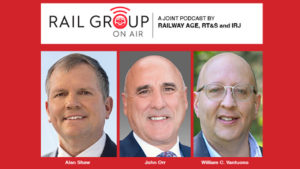AAR to STB: Our system works
Written by jroodThe Association of American Railroads recently told the Surface Transportation Board that the current rail economic regulatory framework is a success for both railroads and their customers. Testifying at a hearing to review regulatory exemptions for certain types of rail traffic, AAR President and CEO Edward R. Hamberger noted that today's rail regulatory policies are the very reason freight railroads are such a critical part of the U.S. economy and vital to our nation's financial recovery. Since 1980, when the government partially deregulated the rail industry, freight railroads have invested $480 billion in private capital to build, maintain and grow the national rail network that serves both freight and passenger rail customers. The hearing examined exemptions from regulation given by the STB and its predecessor the Interstate Commerce Commission to certain types of rail traffic where railroads face aggressive competition for customer business. These exemptions were directed by Congress in an effort to remove government regulation, stimulate industry growth and allow competition to work in the marketplace. "These exemptions work for both railroads and the customers they serve," Hamberger added. "They allow railroads to be flexible to meet customer needs, and to compete with other modes of transportation in the marketplace - particularly trucks." Prior to 1980, government regulations prohibited pricing flexibility, leaving the railroads unable to compete with other forms of freight transportation. Federal controls proved to be detrimental to rail industry financial stability and ultimately hampered their ability to adapt to new circumstances. As a result of this heavy-handed economic regulation, carriers went bankrupt, investments stagnated and countless jobs were lost. "Today's balanced, commonsense regulation works. Now is not the time to reverse this progress as the nation works toward economic recovery," said Hamberger.





